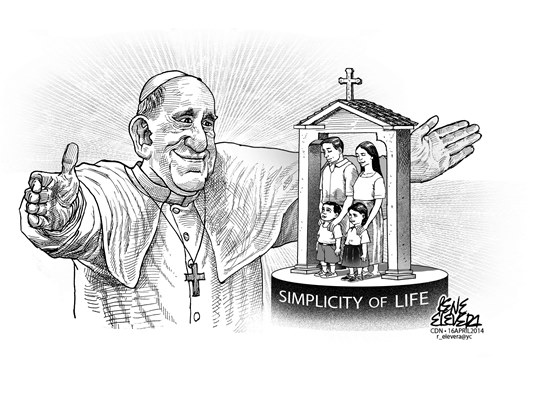Pope Francis chose as the theme for this year’s celebration of Lent a passage from Saint Paul’s second letter to the Corinthians: Jesus Christ became poor so that by his poverty, you may become rich.
The Holy Father’s own simplicity has been a powerful tool in delivering the point behind the theme and in highlighting the beauty of its paradox.
By eschewing what most of the secular world perceives as the princely trappings of the papacy—from ermine-trimmed capes to the costly Popemobile—he has reclaimed the moral resonance of the voice of the Church that has always preached that life is more than food, clothes or cash.
Pope Francis’ downward mobility is also visible in the many times he has broken through his cordon sanitaire to mingle with the flock. At the start of Holy Week, the global press was abuzz with reports about his selfie sessions with young people after he led Palm Sunday rites at the Vatican.
What can enriching our neighbors by choosing to be poor mean for us in materially-impoverished Philippines or in Cebu—a treasure chest of Christian heritage?
The lay members of the Church-based group Dilaab provides us with one answer in their holistic outreach to street children.
It is an understatement to say that in Cebu City, the government has placed residents in a bind with its intensified enforcement of an anti-mendicancy ordinance.
The ordinance forbids the public on pain of incarceration—as stated in bold fonts in freshly-printed tarpaulin banners hung across the city—to give anything to the destitute who live in the streets.
There is logic in the ordinance since people should not loiter in the busy streets, risking injury or death through all sorts of accidents in exchange for the chance to earn a few coins.
Nevertheless, the ordinance strains the creativity of well-meaning citizens who wish to emulate the good Samaritan’s virtue of unhesitating helpfulness.
Dilaab’s outreach program for Cebu City’s street children is a creative solution to the problem of the flourishing of street children and of mendicants in general.
The movement led by Fr. Carmelo Diola, a seminary professor has teamed up with private donors, authorities like the police and most importantly, the parents or guardians of the kids to clean up, educate and feed them.
Early in April, after the children were schooled in Christian Living, Fr. Diola and his team accompanied them to the Archbishop’s Residence where they made their first confession and were given first communion by Cebu Archbishop Jose Palma.
Projects like the Dilaab outreach are worth supporting or replicating. This is one way of pouring out time, talent and treasure, of having less so that our brothers and sisters may have more.
